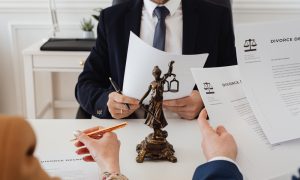
Your professional license allows you to practice your profession and earn a living in Illinois. Having your license suspended or revoked can severely impact your career and livelihood. That’s why it’s critical to protect your professional license if facing potential disciplinary action from the Illinois Department of Financial and Professional Regulation (IDFPR).
This article will provide an in-depth look at defending your professional license from IDFPR disciplinary proceedings. First, we will help you understand IDFPR’s role in licensing and regulation. Next, we will explain how criminal convictions and disciplinary actions work and how they can threaten your professional license.
We will then outline the step-by-step process for protecting your license when facing potential IDFPR discipline. This includes consulting with an experienced professional license defense lawyer, cooperating with investigations, developing a strategic defense, exploring settlement options, and preparing for hearings.
Additionally, we will provide tips tailored to defending licenses for specific professions like healthcare, accounting, real estate, and law. Finally, we will summarize the key takeaways you must remember when protecting your professional license from suspension or revocation.
With the right help from an experienced professional license defense attorney, you can avoid losing licensure and continue practicing your profession. Read on for a comprehensive guide on protecting your livelihood and reputation.
Understanding IDFPR’s Role in Licensing
The IDFPR oversees the licensure process and regulates professional conduct for over one million professionals in Illinois. This includes doctors, nurses, accountants, real estate agents, and other licensed professionals.
IDFPR’s mission is to safeguard the public by ensuring education, experience, and examination standards are met before issuing a license. They also monitor licensees to ensure compliance with state laws and professional ethics.
If IDFPR receives a complaint or becomes aware of alleged misconduct by a licensed professional, they have the authority to investigate and impose disciplinary sanctions if violations are found.
How a Criminal Conviction Can Threaten Your Professional License
One of the most common triggers for disciplinary action is a criminal conviction. IDFPR requires disclosure of any criminal history during the initial licensing process. Failure to fully disclose your record can itself be grounds for discipline.
Many professions also impose an ongoing duty to report new criminal charges to IDFPR within a specified timeframe. A conviction for any crime has the potential to threaten your professional license. Some convictions that may warrant discipline include:
- Drug or alcohol-related offenses like DUI
- Violent crimes, including domestic violence
- Sex crimes
- Fraud or financial crimes
- Felonies or serious misdemeanors
The licensing board will look at factors like the nature of the crime, whether it relates to your professional practice and potential risk to clients or patients. Any criminal conviction calls for promptly consulting with an experienced professional license defense lawyer.
How Disciplinary Actions Work
If IDFPR initiates a disciplinary proceeding against your license, here is a general overview of what to expect:
Complaint Filed: The process starts with a complaint alleging misconduct. This may come from a client, patient, employer, law enforcement agency or other source. IDFPR investigators will gather evidence related to the allegations.
Notice of Hearing: If IDFPR finds sufficient evidence, they will file a formal complaint against the licensee and issue a Notice of Hearing for proceedings before the appropriate licensing board.
Pre-Hearing Conference: This offers a chance to settle the matter or narrow the contested issues before a full hearing. Having an IDFR attorney at this stage is extremely helpful.
Administrative Hearing: This is a trial-like proceeding before the licensing board or an administrative law judge. Both sides present evidence and testimony supporting their case.
Board Decision: After the hearing, the board will issue a decision and disciplinary order. Possible sanctions range from license probation or suspension to full revocation.
Appeal: If the board rules against the licensee, an appeal may be filed in state court seeking to overturn the decision. However, this is difficult once the board has ruled.
The best chance at defending your license is during the investigative and pre-hearing stages before the board has committed to disciplinary charges.
Protecting Your Professional License
If you receive notice that IDFPR is investigating or moving forward with action against your professional license, take immediate steps to protect your livelihood:
1. Consult With a Professional License Defense Lawyer
Engage an attorney experienced in handling IDFPR license disciplinary cases, such as those from 1818 Legal as early as possible. An experienced lawyer understands IDFPR’s rules and procedures and how best to defend against potential charges. They can guide you through the process and represent your interests in negotiations or hearings. Don’t wait until after disciplinary action has been taken to involve a lawyer.
2. Cooperate Fully With the Investigation
If contacted by IDFPR investigators, be cooperative and transparent. However, have your lawyer assist with any written responses or interviews. Provide copies of any requested records. Your lawyer can ensure you don’t make statements that could unintentionally harm your case.
3. Develop a Strategic License Defense Plan
Your lawyer will carefully assess the allegations, the strength of the evidence against you, your disciplinary history, and other factors. They will then develop a defense strategy to avoid sanctions or minimize their severity. This may involve presenting mitigating evidence or developing legal defenses. With criminal charges, the strategy may include seeking a plea deal to lesser charges or deferred adjudication.
4. Explore Settlement Options
Rather than proceeding to a full hearing, your attorney may be able to negotiate a settlement with IDFPR. This may involve agreeing to sanctions like a fine, probation period, education courses, or temporary license suspension. Settlements avoid the risk and expense of a hearing and can result in less severe sanctions.
5. Request a Pre-Hearing Conference
If IDFPR proceeds with filing a complaint against your license, immediately request a pre-hearing conference. These are excellent opportunities to potentially resolve the case or narrow the scope of charges and contested issues. Because the full board has not yet heard the evidence, the conference offers a chance to sway IDFPR’s view of the case.
6. Prepare a Strong Defense for the Hearing
Your lawyer will contest the evidence and allegations against you if a hearing becomes necessary. This may include cross-examining IDFPR’s witnesses, presenting your witnesses, introducing evidence, and making legal arguments. The stronger your defense, the better your chances of avoiding license suspension, revocation, or other discipline.
7. Seek a Favorable Resolution if the Outcome is Negative
If you receive an unfavorable ruling from the licensing board, promptly discuss your options with your attorney. In some cases, an appeal may be possible. In others, your lawyer may be able to negotiate a probation period or conditions that allow you to continue practicing while satisfying the board’s concerns. Don’t simply give up if the initial result is negative.
A Professional License Defense Lawyer Can Help
For professionals facing potential IDFPR discipline, the stakes are high. Your career, reputation, and financial security are all on the line. Don’t leave your livelihood to chance. Consult with an experienced professional licensed defense attorney as soon as possible. An attorney can help you understand the disciplinary process, build the strongest case, and protect your ability to continue practicing your profession. Contact a professional license defense lawyer today if your license is at risk.
Key Takeaways
- Disciplinary action in one state can affect licenses held in other states. Seek experienced legal counsel if facing discipline.
- Even if the board requires disclosure, consulting with an attorney is paramount to understand how likely information could be used against your license.
- Lawyers with years of experience managing professional license issues can help you understand disciplinary processes and prepare a strong defense.
- Retaining an experienced professional license attorney as soon as possible gives you the best chance of retaining your license.
- If you hold licenses in more than one state, an attorney may be able to help prevent discipline in one state from affecting your licenses elsewhere.
- Your criminal law and professional license defense lawyers should work closely together for criminal charges related to your profession.
- Some boards allow a probationary period or conditions to retain your license while satisfying concerns. An attorney can advise you on options.
- Suspended or revoked licenses may be able to be reinstated. An experienced professional license attorney can guide you through the process.
Frequently Asked Questions
1. How can I protect my professional license from disciplinary action if I have a criminal conviction?
If you have a criminal conviction, it is of the utmost importance to consult with an experienced professional license defense lawyer as soon as possible to protect your license. A skilled attorney can advise you throughout the stages of a disciplinary proceeding and build the strongest defense against suspension or revocation of your license. They understand how to present mitigating factors, develop legal arguments, and negotiate settlements with the licensing board. Retaining legal counsel early maximizes the chance of keeping your license.
2. What steps should I take if I receive notice that my nursing license may be revoked for professional misconduct?
Promptly retain an experienced professional license defense attorney to protect your nursing license if you receive notice of possible revocation. Do not delay in seeking experienced legal counsel. An attorney can represent you before the state board of nursing and guide you through the disciplinary process. They will investigate the allegations, challenge improper evidence, and present your defense at any hearing. Although defending your license can be difficult, an experienced lawyer will do everything possible to safeguard your professional credentials.
3. When should I contact a professional license defense lawyer if I face possible disciplinary action against my license?
You should contact an experienced professional license defense attorney as soon as you know of any potential disciplinary action related to your license. Do not wait until charges have been filed or penalties imposed to retain counsel. An experienced lawyer can advise you from the earliest stages and provide skilled guidance at each step. Consulting an attorney promptly allows the most time to build your defense strategy. This maximizes the chance of avoiding suspension, revocation, or other discipline against your professional license.
4. My license was suspended in one state; how can a lawyer help prevent this disciplinary action from affecting my licenses in other states?
If your professional license is suspended in one state, immediately retain an attorney experienced in multi-state licensing issues. They can help prevent your suspension from triggering reciprocal discipline in other states where you are licensed. The lawyer will work to demonstrate why sanctions should be confined to the original state board’s jurisdiction. They will also guide you in remedial steps to show rehabilitation, which can influence other states’ actions.
5. What types of professional license applications require disclosure of past disciplinary actions against your license?
The vast majority of professional license applications and renewals will require you to disclose any prior disciplinary actions against your license. This includes sanctions imposed by licensing boards, criminal convictions, and restrictions on your license. Before answering these application questions, it is vital to consult with a professional licensing attorney to understand how your specific disciplinary history could impact your license. An attorney can advise you on answering fully while minimizing further consequences.






